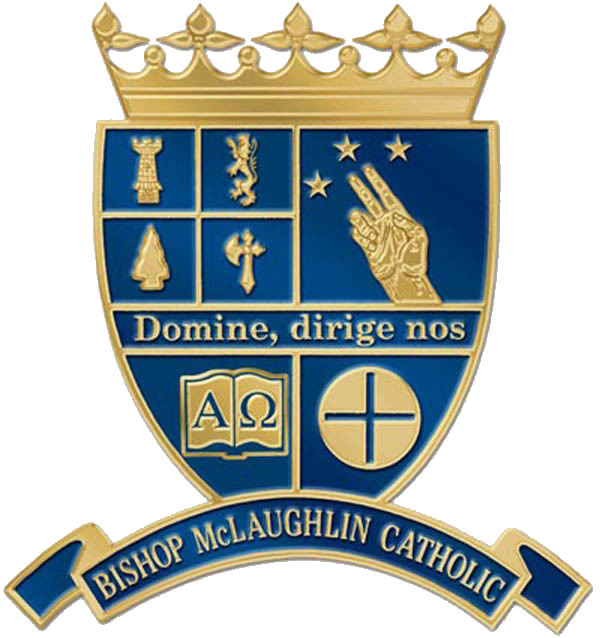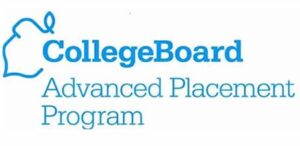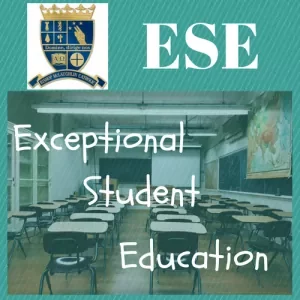
Our Newsletter
The Hurricane family invites you to join our email list to receive monthly, exciting news about Bishop!

Welcome
At Bishop McLaughlin, our definition of academic excellence encompasses more than grades. St. Charles Borromeo taught us that “We must keep ourselves in the presence of God, as much as possible.” We at Bishop believe that we must educate our students, but more than that, we must provide them with Catholic understanding and character to put their knowledge to good use for themselves, our Church and the world.
At Bishop, we strive to create an appealing and stimulating curriculum for all of students. Each student’s schedule is tailored to the individual’s talents. Bishop McLaughlin offers five levels of academics: Advanced Placement and Dual Enrollment, Honors, College Prep 2, College Prep 1 and ACCESS. Students are not locked into any track and may move up or down depending on their performance. In addition, a student may be scheduled in Honors in one subject, but placed in College Prep 2 in another.
Bishop McLaughlin Catholic High School is fully accredited by the Southern Association of Colleges and Schools Council on Accreditation and School Improvement (SACS CASI). We also hold membership in the National Catholic Education Association (NCEA) and the Florida High School Activities Association (FHSAA).

The Advanced Placement Program is administered by The College Board, a national nonprofit membership association. Bishop McLaughlin Catholic High School is a member school offering AP courses. Courses are taught by Bishop McLaughlin faculty and are comparable to first-year college courses. At the conclusion of an AP course, students must take the corresponding AP exam. AP exams are three-hour multiple choice and essay question exams given in May. Exams are graded on a scale of 1 to 5, with 3 considered a “qualifying” score. There is an exam fee which will be collected with the annual registration fees in August. The College Board cites these benefits to Advanced Placement Courses:

The Advanced Placement Program is administered by The College Board, a national nonprofit membership association. Bishop McLaughlin Catholic High School is a member school offering AP courses. Courses are taught by Bishop McLaughlin faculty and are comparable to first-year college courses. At the conclusion of an AP course, students must take the corresponding AP exam. AP exams are three-hour multiple choice and essay question exams given in May. Exams are graded on a scale of 1 to 5, with 3 considered a “qualifying” score. There is an exam fee which will be collected with the annual registration fees in August. The College Board cites these benefits to Advanced Placement Courses:

Beginning with the 2018-2019 school year, Bishop McLaughlin Catholic High School, in Pasco County, FL, is launching the first secondary education program in the Diocese of St. Petersburg for students with special needs. The Exceptional Student Education (ESE) program was created in response to increased demand in Pasco, Hillsborough, Hernando, Pinellas, and Citrus counties to provide secondary Catholic school options. The Bishop McLaughlin Catholic High School ESE program serves the Tampa Bay community including Spring Hill, Hudson, New Port Richey, Wesley Chapel, Lutz, Odessa, and Tampa, This diocesan program, designed for students with learning challenges and related difficulties, provides an environment where each student’s uniqueness is valued. The student’s self-esteem is enhanced in an inclusive, nurturing, and supportive setting that provides opportunities for students to grow spiritually, academically, socially, emotionally, and physically.
This program is dedicated to serving students who think and learn differently, or who need specific support and accommodations for educational success and spiritual growth. Certified special education teachers provide students with opportunities to be successful while stressing the importance of personal integrity, appropriate social skills, and good work habits. This program will consists of both an inclusive model with support, as well as self-contained classrooms, depending on the student’s specific needs. All students enrolled in this program must fulfill the graduation requirements established by the State of Florida.
Financial Aid:
Parents are also encouraged to apply for state-funded scholarships such as the McKay Scholarship, Florida Tax Credit Scholarship, or Gardiner Scholarship. If your child currently has a 504, IEP, or learning disability, please visit the Florida Department of Education School Choice website, www.floridaschoolchoice.org, to review the requirements for each scholarship.
BMCHS’s financial aid application is processed through our tuition management company, FACTS. All parents are required to complete the FACTS forms for on-line tuition payment management. Please visit their website, www.factsmgt.com. Once all required documentation has been provided and uploaded, applications will begin the verification process.
The next step in your academic career is deciding where to apply to and attend college. A college education offers lifetime benefits and is one of the best investments you can make for your future. By applying to a range of colleges, you can expand your opportunities and increase your likelihood of success. Attending a college that is a good fit for you can be a fulfilling and transformative experience! – Excerpt from The College Board
Requirements for Graduation
In order to participate in the Baccalaureate Mass and Commencement Ceremony, a student must fulfill the school’s academic and service requirements and have no outstanding financial obligations. A total of 28 credits is required for graduation. Graduation requirements are as follows:
Current Graduation Requirements
Browse though these tabs for links to useful resources to plan for your college education.
General Resources:
Applying to College:
Student-athletes who plan to participate in athletics at college may research this at a number of the links below. Note that prospective student-athletes have certain responsibilities to meet to be eligible to participate in athletics in Division I and Division II college programs. Visit NCAA Online and the NCAA Initial Eligibility Clearinghouse for more info.
More Info on Catholic Scholarship Promise
Each year, an estimated 300,000 students and parents are cheated by scholarship scams, according to the Financial Aid Information Page, a comprehensive financial aid web site. “Fraudulent scholarship and loan companies are counting on families in desperate need of financial resources to not thoroughly investigate their company,” cautions Bob Williams, President and CEO of the Better Business Bureau. Scholarship scams have existed for years but with increased usage of the Internet, they are on the rise. Dr. Kenneth Hartman, author of the College Board’s “Internet Guide for College-Bound Students,” and contributor to the College Board’s web site, provides the following warning: “Scholarship scam artists lurk on the World Wide Web, and they could be hazardous to your bank account.”
Several warning signs have been reported to the Financial Aid Information Page and the Better Business Bureau. The following are just a few:
Source: A Fall Issue of “Higher Education Access” a publication of the Higher Education Center at the Boston Public Library.
Recently, the Federal Trade Commission found a number of Web sites with deceptive practices. Companies posing as scholarship search or financial-aid foundations charge from about $25 to provide lists of scholarships, to more than $800 to guarantee eligibility for a minimum amount of financial aid. These promises of guarantees are not possible. To identify false claims consult the following web site: www.ftc.gov/scholarshipscams Beware of services that do “all the work” students must apply for scholarships and grants. Advice: Don’t give out credit card or bank account information to “hold a scholarship.” Scholarship lists are available at schools and libraries or at www.fastweb.com and www.collegeboard.com.
Source: Dallas Martin, Ph.D., president, National Association of Student Financial Aid Administrators, Washington D.C. www.nasfaa.org
As students aspiring to attend the college of your choice, you need to follow the 4-year timeline to ensure you stay on track to reach your goals for college.
The mission of Bishop McLaughlin Catholic High School’s Counseling Department is to provide a developmental and systematic comprehensive program that ensures academic, personal, social, and career development and achievement for all students. The program is proactive and preventative in its focus and enhances the learning process by assisting students in acquiring critical professional standards and appropriate models of best practices in the field as an integral part of education. Bishop McLaughlin Catholic High School’s counseling program is designed, implemented, and managed by professionally trained and certified counselors who provide a systematic array of curriculum, interventions, and services that include the skills and knowledge of counseling, consultation, coordination, and curriculum. Professional school counselors are charged with advocating that all students benefit from the educational program. They work collaboratively with school staff, families, and members of the community to provide seamless transitions from school-to-school and school-to-career so that all are productive citizens and effective leaders. For more information email Director of Guidance or call (727) 857-2600. -Excerpt from The College Board
Here are a few resources to help you navigate the process of selecting a college or university and applying for admission a little easier.
You can stop by the main office to request to see your guidance counselor. Who knows? Your counselor may be available to talk right now! For simpler questions or to make an appointment, email your counselor directly. It’s a great way to get a fast response. Be sure to include your homeroom teacher’s name and the period you are interested in making the appointment.
See the “Guidance Appointments” above in the counseling resources section.
101850
Bishop McLaughlin Catholic High School
13651 Hays Road
Spring Hill, FL 34610
Phone: 727-857-2600
Fax: 727-857-2613
Complete a Transcript Release form and submit it to Guidance.

Your student handbook has a list of activities. Listen to announcements, watch bulletin boards, talk to the advisor or your friends to find out when the next meeting is, and go! Sometimes it’s easier to start a new activity if you go the first time with a friend or someone who is already a member of the activity.
Your (child’s) teacher is always the best resource for accurate and complete information about classroom events and student performance, so it is always best to begin by speaking to him or her. Your (child’s) counselor might also be a good resource for more general strategies and interventions, or to provide support to you (your child) in school. In the very rare situation where your concern can not be resolved at this level, you may want to speak to the department supervisor.
Either by voicemail or e-mail. See the staff directory.
Yes, but consider approaching your teacher first to see if he or she can assist you. In addition, the National Honor Society provides tutors in a drop-in lab and one-to-one on a limited basis. Guidance will have more information about this opportunity. Students who require intensive and ongoing remediation may have greater success by working with a private tutor. Your counselor or teacher may be able to offer some names of private tutors.
It is recommended that a student take the SAT and ACT at least once before the end of their junior year.
This varies from student to student, but most counselors recommend taking it two or three times.
Students should be careful in taking the SAT multiple times, as the College Board will send ALL previous scores to these universities. For this reason, students should not take the SAT more than 3 times total, and should be careful to study between these tests to make sure each successive score report shows an improvement over the previous.
You can take the ACT more than once and can elect which scores are sent to colleges for review.
Subject Tests are sometimes requested by colleges as well, although they are seldom required. The best time to take a College Board Subject Test is at the end of a year in which a student is taking the highest level of the subject in which the student wants to take the test. Students should prepare for Subject Tests by reviewing content material for the test, so it may make sense to take biology, chemistry, physics, foreign language or math on a June test date.
Get more info and register online at www.collegeboard.com.
Get more info and register online at www.act.org.
College visits are the most critical step in completing your research. It’s the only way to get a true feel for a campus and whether it is the right fit for you. Additionally, you may be interested to know that after considering your grades, courses taken in high school, and test scores, an absolutely key variable in an admissions committee’s decision to admit a student may be whether or not that student has actually taken the time to visit the campus! This is especially true of a student whose GPA, course selection, or SAT scores are not quite as high as the committee would like. On the many college visitations that your guidance counselors have made, admissions reps frequently mention that when tough choices have to be made in admitting a few students from a pool of similarly qualified individuals, whether a student has visited campus can be the deciding factor. If at all possible, make that visit! If it is a true hardship for you to make that visit, put that and the reason for the hardship in writing and ask the admissions office to include it in your application file.
Many college representatives visit BMCHS each fall. If you are seriously interested in attending a college or university that takes the time to visit BMCHS, then you should make every effort to attend that meeting. The representative who visits will often be the person who does the first read of your application when you apply. Make a good impression by coming to the meeting and being prepared to participate in the conversation. It’s your chance to show your best to the person who is in the best position to advocate for you when admission decisions are being made!
Questions to Ask College Admissions Reps is a list of questions that may help you elicit important information about colleges you are considering. Asking pertinent questions helps to present you as an interested, active applicant rather than an apathetic passive one.
The things you do in your spare time may be the coolest thing a college admissions representative ever heard about! Don’t be afraid to tell about yourself, and the passions in your life, when you apply to that college of your dreams. If you don’t tell, who will?
Most often, students who receive the most merit aid receive this from the college that they choose to attend. To find this aid requires diligent research into each individual college’s available scholarships. Usually, eligible students are automatically offered scholarships for which they are qualified, but early research at college financial aid offices, or by checking a variety of resources, online and in print (Ex: CollegeBoard’s Scholarship Handbook) yields the most $$$ for students. BMCHS receives notices about many privately offered scholarships and keeps a file of applications in the Guidance Office. For more information, visit our Scholarship Section.
Thank you for considering Bishop McLaughlin Catholic High School. Click “Apply Now” to get started or call 727-857-2600 for more information.
